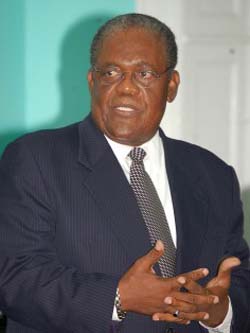<<< Prime Minister Rt. Hon. Hubert Ingraham.
By Sharon Turner
Nassau, Bahamas – President of Guyana Bharrat Jagdeo has supplied documents to Prime Minister the Rt. Hon. Hubert Ingraham in respect of his claim that a substantial portion of CLICO’s (Guyana) assets were tied up in the operations of CLICO Bahamas Limited, Mr. Ingraham told reporters Monday.
Responding to a question on the matter Mr. Ingraham said, “I told President Jagdeo that he ought to make available to me all the information that they had to substantiate their claim.
“He caused that to be delivered to me in Belize City. That would have been delivered by my Office to the Registrar of Insurance and the Liquidator today (Monday). I expect to be able to know from them today (Monday) the legitimacy of that documentation, and if they are as they appear to be, to so inform the President of Guyana.”
Back on March 2 during his communication to Parliament following the announced liquidation order for CLICO Bahamas Limited, Mr. Ingraham advised that he received several telephone calls from Mr. Jagdeo following that announcement, expressing that “some 53% of CLICO’s (Guyana) assets were tied up in the CLICO Bahamas operations.”
Mr. Ingraham told reporters that no such information regarding the claim was available to The Bahamas at that time.
Insurance sector regulators in the Caribbean met in Trinidad last week to discuss the CLICO matter, and have been mandated to prepare a report for Heads of Government in the Caribbean.
“We are proposing to have a meeting in Barbados to discuss CLICO and several other things, perhaps by the end of this month,” Prime Minister Ingraham said.
“We have determined that it is a Caribbean-wide problem; that no individual country would seek to go on its own without consultation with the Group and that we may therefore be in a position to make some determinations based upon the reports which we receive from the regulators of insurance.”
In addition to laying out the facts and circumstances surrounding the state of CLICO Bahamas Limited during his recent statement to Parliament, Mr. Ingraham also advised policyholders in The Bahamas on how to proceed during the liquidation period.
“Should I continue making my premium payments? The answer is yes,” he advised. “The Company’s principal office located at Mount Royal remains open for business. If the Liquidator enters into an agreement with a local insurer, he can only transfer policies that are in force and not those that have lapsed due to non-payment.”
It is advice Mr. Ingraham said policyholders in The Bahamas have been following.
“I am very pleased that the public of The Bahamas has been accepting my word as being words they could live by and have been doing exactly what I asked them to do – continue to make their payments until I tell them otherwise,” he said Monday.









ELCOTT COLEBY SOUNDS OFF ON CLICO AND THE COP APPOINTMENT
20TH MARCH 2009
FOR IMMEDIATE RELEASE
Regarding the recent CLICO debacle, it remains unclear what steps the government intends to take to ensure that this kind of debacle does not happen in the future; provisional liquidation is reactionary measure and does not ensure that this kind of collapse would not happen in the future.
All indications are that the FNM’s strategy is to blame this collapse on the PLP, effectively excusing the FNM government of any responsibility for a catastrophe that happened under their watch and was within their control to do something about proactively. The leader of the opposition stated in the media that no application was filed (during his time as PM) with the Central Bank by CLICO to repatriate funds and the former Minister of State for Finance also indicated that he was unaware of any capital repatriation from the Bahamas by CLICO.
Apart from ColinaImperial and Family Guardian et al expressing some interest in acquiring the assets of CLICO; apart from the President of Guyana providing evidence of his country’s financial interest in CLICO; apart from the liquidation process; apart from Mr. Gomez stating publicly that it is too early to determine whether or not the policy holders will recover any of their investment, what has the government done to engender public trust and confidence in the quality of their governance surrounding this crisis? Where is the government’s desire to pursue and protect the public interest in all of this?
By now there should have been an inquiry into this collapse of CLICO for two reasons: firstly, insurance industry insiders described CLICO’s collapse as an isolated case and assured the public that the insurance industry is fundamentally sound. This stated position points to possible failures in operational processes and procedures, internal control weaknesses, inadequate supervisory oversight, and possible regulatory and legislative weaknesses. Secondly, there are 23,191 policy holders involved with policy liabilities totaling some $44 million, therefore, CLICO’s failure directly and adversely impacts a significant number of Bahamians. For these reasons it is in the public interest to investigate this collapse with a view to determining all causal factors and root causes, and to implement an action plan to protect against a reoccurrence of this king of debacle in the future. These steps are necessary to bolster public confidence in the state’s ability demonstrate accountability through proper regulation, intervention, and enforcement in any institution or industry where the public interest and welfare are at stake.
The recent confirmation of Reginald Ferguson under Article 119 and 120 of the constitution is cause for concern because of the government’s general disregard for the principles of democracy, Westminster Conventions, and demonstrated duplicity surrounding this appointment.
Some Bahamians can recall that Dudley Hanna was Sir Lynden’s choice for Deputy Commissioner of Police. When Sir Lynden could not secure a concurrence from the then Leader of the Opposition, Norman Solomon, he respectfully withdrew Dudley Hanna’s name from consideration and selected a candidate with whom both men could agree. I applaud Sir Lynden’s reverential respect for the principles of democracy and established Westminster Conventions. The reasons for Mr. Solomon’s objection were immaterial; what was material was the fact that Mr. Solomon commanded the political support of a significant portion of the Bahamian population and the appointment of a Deputy Commissioner of Police over his objection could potentially divide and polarize the country. That appointment, therefore, would not be in the public’s best interest. The opposition is on record as objecting to this appointment.
There is also the issue of duplicity and hypocrisy. The FNM was critical of the covert operation at the LPIA involving baggage handlers and condemned the PLP government, but praised and rewarded Mr. Ferguson who intimately involved in the operation; this is duplicitous.
Mr. Ferguson was condemned by the Lorequin Commission of Inquiry as mishandling the investigation. The government recently invited some 14 officers to retire, citing age, operational deficiency, and low morale as the reasons. Not only was Mr. Ferguson older than all of the dismissed officers, his competence was called into question by an objective commission. Further, while he was in charge of crime, the country experienced the highest rate of murder with 74 in 2000. In the last election campaign, the present PM said that crime was out of control and this PLP government was paralyzed to do anything about it. That statement itself is n indictment of Mr. Ferguson’s performance. Again there is duplicity on the part of the government.
The FNM, who loved to accuse the PLP of nepotism and cronyism, appointed their party chairman’s brother to COP, which has the appearance of both cronyism and nepotism on the surface.
Finally, the PM sent two senior officers off for further training because nobody was suitably qualified for the post of Commissioner of Police. After receiving the requisite training, not only were the most qualified officers denied the position, but Mr. Ferguson, who was not suitably qualified in 2007, became mysteriously qualified over the last year. This action too is dubious and duplicitous on the part of the government.
END
Joe Blow, thank you for that advise, we can never know too much. I agree….one of the deadly sins is greed!” On that note B.P. should pay you for being a”Streaming On-line financial advisor.”
Again thanks.
continuing from the Zakaria report: “Canada has been shielded from the worst aspects of this crisis because its housing prices have not fluctuated as wildly as those in the United States. Home prices are down 25% in the U.S., but only half as much as in Canada. Why? The Canadian tax code does not provide the massive incentive for overconsumption that the U.S. code does: interest rates on one’s mortgage isn’t deductable there. Home loans in the United States are “non-recourse” which basically means if you go belly-up on a bad mortgage, it is mostly the bank’s problem. In Canada, it is yours. In the U.S. interest deductability costs the federal government $100 billion a year-because their government allows the average Joe to fulfill the American dream of owning a home. 68% of Americans own their own home. Canadian homeownership is 68.4%.”
What is the Bahamian government’s stance on home ownership? Because we do not have income tax, and so no tax incentive, should we concern ourselves with giving a rebate to home buyers? Will that allow more persons to own homes? First home owners get concessions, and affordable housing is in a bracket that does not compel the payment of property tax. Is this a right that is acceptable? Should those who build a more costly house be required to pay property tax? After all, people who live in affordable housing use all the same services the others use. Where is the equity here? My contention is all who own a home should be taxed the same percentage rate no matter the value of the house and property. It is a responsibility that all should have. Also how careful are mortgage lenders in seeing that persons wishing to own houses are in a position to be able to aford the house they wish to buy. Are developers and mortgagors compelled to disclose to the buyers all the additional costs over and above the down payment? Should the government enact laws that the holder of the mortgage be required to inform the buyer that only the interest need be paid in times of stress. Should the government interfere when the owner of a house is in danger of foreclosure? Should the government require realators to have a set commission no matter the assessed value of a property?
Wisdom: I will respond to your questions with your understanding that I do not know anything about you or your financial position.
1. Ask yourself what level of a “risk-taker you are in investment terms? How much do you know about the institution you have invested in?
Are you comfortable with the integrity of that Co? Why have you invested? Is it for a retirement income in the future? What is your debt ratio to your investment ratio? How old are you? You need not answer these questions to me. They are asked so that you will have some idea what motivates you in an investment. Now I speak in generalities and with my limited but somewhat successful knowledge in the investment field. For minimal investors who have a low tolerance for risk, one should invest in guaranteed bonds, well-regulated mutual funds, bank insured certificates of deposits. I would not use only one vehicle for my money. Diversity of investments is key at all levels. If I were a medium risk investor, I would follow the same as above and reserve a portion of my money for an investment in the stock market in a growth type stock. This, of course, with the understanding that the stock will fluctuate over a period of time. If you are a high risk fellow, you invest 2/3 of your money in the above and take the risk of winning big or losing big with the other third.. When you are at this risk level ,you will only be successful, if you are prepared to set a price limit on both your buy and sell. And you must stick with the sell price even if you have a “gut” feeling the price will continue to rise. One of the deadly sins is greed! Now to your $120,000.00 investment. I will assume that this is your major money investment. If so, it is not wise to keep it all in one institution. We have only to look at CLICO and even some of the major financial institutions in the States, which have had a good reputation in the past. I hope that even in these hard times you will set aside at least 10% of your gross income for investment purposes. It appears to me that that and hard work is the only way for the little man to get far enough ahead to have at least minimal comfort at retirement age. Good-luck to you ! Remember, all of you. If you have credit card debt, pull your belt extra tight and get rid of it before all else, except the necessities of life. When you’ve done that never use your credit card for purchases unless you have the money to cover those purchases, in the bank.
Joe Blow: What do you recommend to me, if I have $120,000 invested in a Financial Institution?
Wisdom: once your children leave the nest, you really don’t want them back(except for brief visits), disturbing your hard earned peace. Thanks for brightening my day with your “tongue in cheek” humour.
As to Mr. Manning’s reaffirmation, he sounds to me like a man of intelligence, good sense and patience. “Let us not come to conclusions prematurely” is something we should all emulate. Good Cheer to you, my friends.
Hear the other side—Manning
Gail Alexander | 10:11 pm
Published: March 18th, 2009
Gail Alexander | 10:11 pm
Prime Minister Patrick Manning yesterday reaffirmed confidence in his Finance Minister Karen Tesheira despite calls from the Opposition and other quarters for her to resign over the Clico shareholding issue in which she is embroiled.
“Mrs Tesheira will be addressing the Parliament on this matter on Friday (tomorrow) and until such time I suggest you hold your fire and get the facts before making any further comments,” Manning said during a media briefing at the Diplomatic Centre in St Ann’s. Asked if he had confidence in his minister, Manning replied: “I wish to reaffirm confidence in the minister I had when she was first appointed in that position and until such time that something happens that causes me to want to change that—the status quo remains.”
Manning confirmed the Trinidad and Tobago’s Guardian’s information in yesterday’s article that Tesheira would be making a statement in the Lower House tomorrow. A special Cabinet session was held before Manning’s media briefing yesterday. He confirmed the Tesheira issue was discussed in Cabinet. Latest information is that Tesheira does not plan to announce a resignation in her statement tomorrow. And Manning’s reaffirmation of his support for her yesterday—and his strong urgings to hear her side of the story—have heightened speculation that Tesheira would be retained in Government.
However, at yesterday’s media briefing, Manning at first declined to discuss the issue which had simmered recently. This concerns allegations of Tesheira’s $11 million shareholding in CL Financial during the time that she presided over the CLF bailout recently. The Opposition, accusing Tesheira of conflict of interest, has called for her resignation, or for her to be dismissed. But Manning said he had already come to his conclusion. When asked what was his conclusion, Manning said, “That’s a private matter, let’s await the Minister of Finance.
“Let us not come to conclusions prematurely, let us hear what the Finance Minister has to say on Friday and you will come to your conclusions in the same way I’ll come to mine,” he added. Manning said that hearing the other side of the story was a fundamental tenet of law. “Please don’t come to premature conclusions…On Friday, you’ll hear it all in Parliament and I don’t think it is prudent to discuss the matter further,” he said, when pressed about his reaffirmed confidence in Tesheira. “You’ll get the opinion after you hear the other side…I am trying to be fair and equitable—you have heard one side, let us hear the other side.”
What was being seen, Manning said, was a move by those opposed to the PNM Government to put impediments in its way to ensure it cannot operate properly and minimise Government’s achievements. This would be noted in later elections, he projected. “It is Mrs Tesheira today, and I have no doubt it’ll be somebody else tomorrow…We understand it well and we’ll deal with it appropriately,” Manning said, adding that he had been accused of selling a car to the late Dole Chadee and PNM’s Lenny Saith had been accused of debt forgiveness. He also said he was not certain a credibility issue would arise later on the matter. “Let us hear the other side,” Manning repeated.
The Clico bailout
The Prime Minister said the financial problems of the CL Financial Group had also been discussed at last week’s Caricom intercessional meeting in Belize which he attended. Manning said leaders all agreed the issue was a Caribbean problem and were committed to obtaining a Caribbean-wide solution. But he said time was not on the leaders’ side. He said those discussions did not include the aspect concerning Tesheira.
Manning declined to speak about the CL Financial bailout situation, also saying that he had not come prepared to discuss that issue.
He promised to discuss it in “due course,” urging reporters to hear the other side tomorrow from Tesheira. He also urged the media to hear the other side where accusations by the former HDC managing director Margaret Chow against Housing Minister Emily Dick-Forde was concerned.
I always wondered how Banks, Insurances and Financial Institutions employees can live so “high on the hog” with fancy cars, fine clothes, expensive food & coffee, everyday. It logics just don’t add-up. But Mr. Alfred Sears enlightened me on why these “White Collar Villains” can have such huge life styles.
One of Mr. Sears sound bite can get us Black Listed again.
Addressing the CLICO matter, at the meeting with Bishop S. Hall on Monday night, Mr. Alfred Sears made the MOST POWERFUL STATEMENT of this whole CLICO sage. “…Just how MILLIONS of hard earned Bahamian DOLLARS, can vanish out of the Bahamas with out a trace. If some one wants to launder money “INTO” these Banking, Insurances and Financial Institutions, they can do so easily. Now I can appreciate the USA Government for Blacklisting the Bahamas in the late 1990’s.
This Country is not on the right path. Am going to Buckingham Palace to stage a one-man protest, asking the Queen to suspend the Bahamas constitution and take back its Islands.
Clico collapse puts Kalamadeen claim on hold
By Stabroek staff | March 17, 2009 in Local News
The financial meltdown of CLICO (Guyana) has caused a snag in a $200 million insurance policy claim by the family of slain businessman Farouk Kalamadeen, just over a month after the company challenged an attempted to collect on the policy.
Clico had filed court proceedings to bar the Insurance Arbitration Board from arbitrating a complaint by Kalamadeen’s family in January and was granted an interim order by Chief Justice (Ag) Ian Chang that restrained the Board from hearing the case.
Justice Roxanne George-Wiltshire heard the case when it was called yesterday and was informed of Clico’s financial troubles and of the High Court order placing the company under judicial management. As a result, the insurance policy case is expected to be on hold as Clico winding-up hearing continues before the Chief Justice.
On January 26, Clico (Guyana) through its Chief Executive Officer Geeta Singh-Knight filed an ex-parte application in the court seeking a restraining order against the Attorney General, the Commissioner of In-surance and the Insurance Arbitration Board from hearing a complaint filed before the board by Kalamadeen’s family.
Court documents revealed that Jiffy Lubes owner, Mohamed Farouk Kalamadeen had taken out a $200M policy of insurance with Clico payable on his demise. His estate was named beneficiary under the policy and he was also entitled to accidental death benefit of $1.2M at the time of his death.
Kalamadeen’s beheaded body appeared on Cowan Street, Kingston on the morning of April 30, 2008 and almost a month later the family attorney, Bibi Shadick, wrote to Clico informing of his demise and provided a copy of the death certificate.
Shadick was also seeking to have a perfect inventory of the assets of Kalamadeen’s estate and requested that Clico provide her with a full statement of all benefits due to the estate under the policy of insurance to facilitate her application for a grant of letters of administration. But Clico subsequently wrote to Shadick, asking her to note that payment of benefits would be based on formal submission of the requisite claims documents and subject to satisfactory proof of entitlement to receive payments in keeping with the terms and conditions under the policy.
Clico then later wrote to Nariman Kalamadeen, the wife of the deceased, informing her that the estate’s death claim had been denied.
Shadick responded by writing to the Commissioner of Insurance to complain of Clico’s denials of the claim and requested that the matter be referred for arbitration.
The Commissioner of Insurance then wrote to Clico stating that she was in receipt of the compliant and asked for the company to respond.
Clico, through its attorney Roysdale Forde, advised that Section 11 of the Insurance Act of 1998 is ultra vires the provisions of Article 123 of the Constitution of Guyana inasmuch as it seeks to vest judicial and decision making authority in the members of the Insurance Arbitration Board who are not qualified and or authorized by the Constitution to make decisions. Additionally, he claimed the Commissioner of Insurance or her representative is appointed directly by the Minister of Finance in accordance with Section 3 of the Insurance Act and thus there is an incursion of the executive into the judicial sphere.
The company lawyer said also that the authority of the High Court to entertain claims in matters covered by Section 11 (2) (3) of the Insurance Act was removed from the High Court and is now vested in the Insurance Arbitration Board, thus unlawfully ousting the jurisdiction of the High Court, noting that “the determination of disputes in and differences between an insurer and the insured forms part of the jurisdiction of the High Court prior to the enactment of the Insurance Act and therefore subordinate legislation cannot remove or amend the provision of the constitution.”
Further, he said that the Commissioner of Insurance is appointed by the Minister of Finance, who is a member of the executive, and like the two members of the Insurance Arbitration Board do not possess the qualifications of a judge as set out in the Constitution.
Comments are closed.